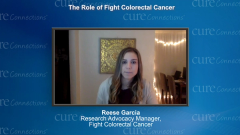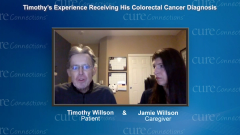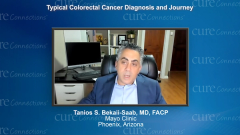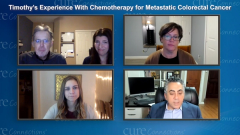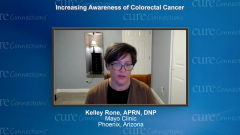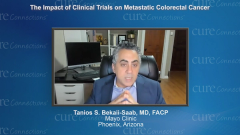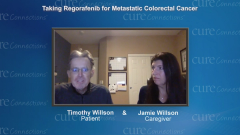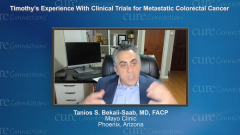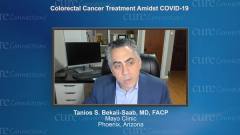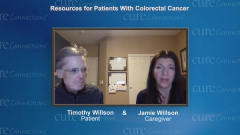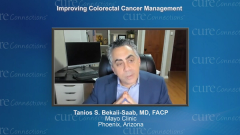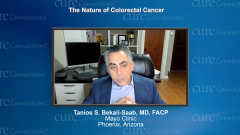
The Impact of Clinical Trials on Metastatic Colorectal Cancer
Episodes in this series

Tanios S. Bekaii-Saab, MD, FACP: In terms of clinical trials, we consider clinical trials as part of our standard as the NCI [National Cancer Institute] and NCCN [National Comprehensive Cancer Network] define it. When we think about the standard options, if a clinical trial is available in that space, then that would be the preferred option, and there is a good reason for it. That is our best shot at continuing to improve care. Over 50 years in colon cancer, for example, we have improved survival from 10 months on average to four to five years, and that is the median. That is just a cut in the middle, but when we think about what percentage of patients are able to survive beyond five years, it was less than 5% even 20 years ago. Now almost half the patients are able to cross that line, and I suspect half those patients will cross the 10-year line in the next few years. Ultimately, we will cure colon cancer as long as we continue on this track, and there is no reason to think we will not. We are doing much better.
Of course, it gets more tricky as we go through multiple lines of therapy. Tim, you know that more than anyone else because you have been through so many lines of therapy. Every time you come out, it is almost as if you are coming out of a boxing match or UFC match. Rather than get some rest, you are going to the next match. You are a little bruised, and you are tired, but you are still in the fight. It gets more tricky.
When I finished my fellowship in 2002, for colon cancer we had 5-FU [5-fluorouracil], and we had irinotecan just coming out. Then there was this drug, oxaliplatin, that folks were talking about. In fact, I had a patient come into my clinic and ask me about oxaliplatin, and I thought, “I do not want to look like I am stupid, but I do not know what this patient is talking about.” I said, “Let me get back to you.” I go out to talk to my attending physician. I say, “What is this drug oxaliplatin?” He says, “It is undergoing a clinical trial, and it sounds promising, but we do not have access to it.” Lo and behold, it becomes one of the drugs that is a standard and elevates the standard in the postoperative setting.
This came after a clinical trial, and they kept pushing the agenda. We then started talking about biologics: bevacizumab, cetuximab, panitumumab. These all came between 2004 and 2006. After that, we started understanding more about how to refine our selection of some of these treatments and understand the value of the genetics of the cancer, such as KRAS mutations and BRAF mutations. We now have HER2 [human epidermal growth factor receptor 2] amplification, NTRK fusions, MSI [microsatellite instability]–high and a number of targets that we can go after, and they keep on expanding. That has moved us quite significantly forward. Of course, we all know the whole world of immunotherapy that came to us in cancer, but in colon cancer it has been limited to a small percentage of patients, and we continue to try to expand it to the rest of the patients.
A lot of options on clinical trials have been coming about. These clinical trials serve quite a bit of purpose. If we think about our standard options, we are limited to two major chemotherapeutic regimens, a couple of biologics that are approved and then two oral agents after the other options stop working, yet we have tons of options that are being explored in different settings on clinical trials. Tim was a perfect candidate. He was a great candidate for enrollment on clinical trials, No. 1, because of his inquisitive mind. As Kelley mentioned, you’d better go into that room prepared because you know something smart is going to come at you, and you’d better know the answer. Tim continues to be motivated about thinking about clinical trials and thinking, “What is next? What makes sense? Even if I am doing well today, I want plan B, plan C and plan D ahead of time,” which is great. You have to have good stamina but also a support system, which Tim obviously has with his family. You must certainly be able to have a clear understanding that this continues to be a partnership among the treating oncologist, the APP [advanced practice provider], the patient and the family. This will help us look at this as a partnership.
Transcript Edited for Clarity

